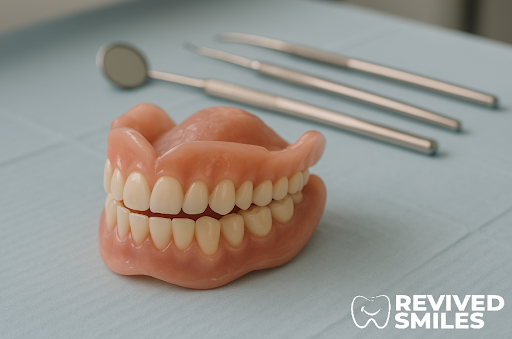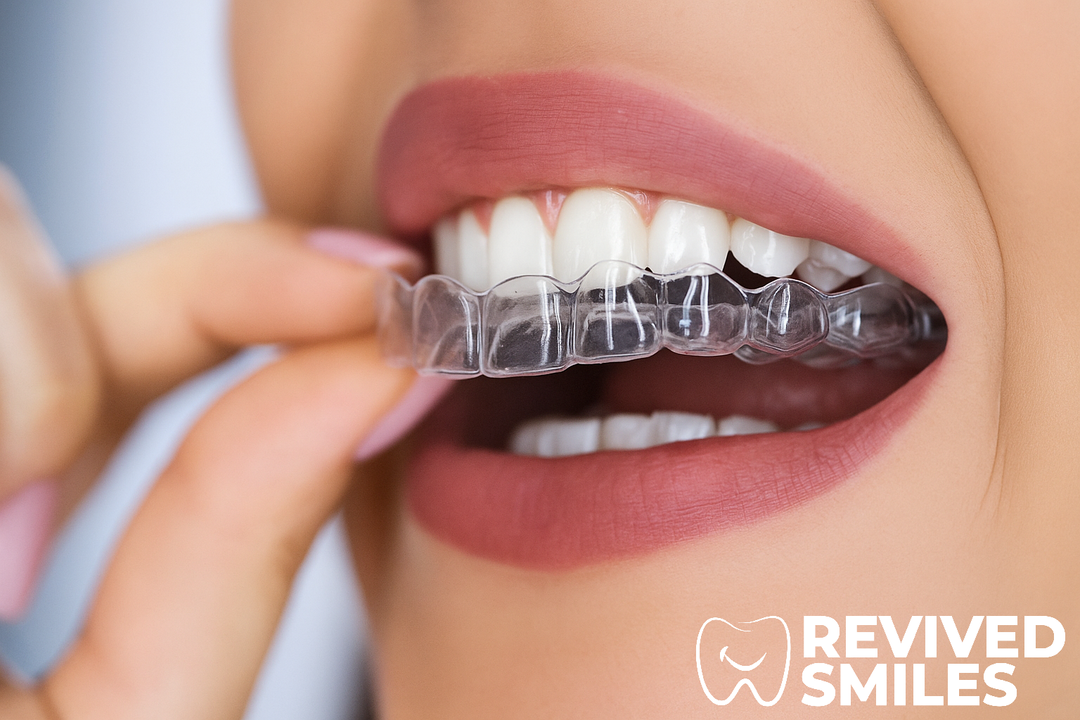Guía para principiantes sobre dentaduras postizas completas

Seamos sinceros, perder todos los dientes naturales puede ser abrumador. Pero las prótesis dentales completas no solo te devuelven la sonrisa; también te devuelven la confianza en ti mismo, la salud bucal y la comodidad diaria. Si es la primera vez que lo haces, no te preocupes.
Lo cubrimos con todo lo que necesita saber para transitar el viaje sin problemas en esta guía para principiantes sobre dentaduras postizas completas.
De Tipos de dentaduras postizas y materiales para su cuidado, mantenimiento y costo: esta guía lo guía a través de los aspectos esenciales de una manera sencilla y accesible.
Ya sea que esté considerando dentaduras postizas completas para usted o un ser querido, estamos aquí para hacer que el proceso sea claro, comprensivo y empoderador.
¿Qué son las dentaduras postizas completas?
Las prótesis dentales completas son prótesis removibles diseñadas para reemplazar todos los dientes naturales en la mandíbula superior o inferior, o en ambas. Estos dientes artificiales, junto con los implantes dentales, le ayudan a masticar, hablar con mayor claridad y mantener una sonrisa de aspecto natural al sostener los tejidos circundantes y la estructura facial .
A diferencia de las dentaduras postizas parciales, que rellenan sólo unos pocos dientes faltantes, las dentaduras postizas completas son para aquellos que han perdido o necesitan quitarse todos los dientes existentes en un arco dental.
Se colocan sobre una base del color de las encías, diseñadas según los contornos de las encías y están hechas a medida para combinar con tu boca.
Con los avances en materiales flexibles y tecnología de base de dentaduras postizas, las dentaduras postizas completas de hoy lucen naturales, se sienten cómodas y pueden mejorar drásticamente su calidad de vida.
Tipos de prótesis completas: convencionales vs. inmediatas
Elegir la dentadura postiza adecuada depende de sus necesidades, plazos y preferencias de comodidad. A continuación, un breve resumen de estos tipos de dentaduras postizas:
Dentaduras postizas convencionales
Se realizan después de que las encías hayan cicatrizado completamente tras la extracción, lo que suele tardar entre 4 y 6 semanas. Este método es común en las prótesis dentales tradicionales, lo que garantiza un mejor ajuste, ya que la forma de la encía se ha estabilizado y hay menos riesgo de pérdida ósea.
Prótesis dentales inmediatas
Se colocan justo después de la extracción dental, para que no tenga que quedarse sin piezas dentales durante la cicatrización. Si bien son convenientes, las encías y los tejidos circundantes pueden encogerse, por lo que a menudo se requieren ajustes o rebasados.
Algunos usuarios de prótesis dentales también exploran las prótesis implantosoportadas o retenidas, que utilizan implantes dentales para sujetar firmemente los dientes de reemplazo. Estas prótesis proporcionan mayor estabilidad y ayudan a reducir el deterioro de la mandíbula.
Materiales para prótesis dentales completas: de qué están hechas
El material de su dentadura postiza afecta su apariencia, comodidad y durabilidad, por lo que su limpieza es esencial. Esto es lo que debe saber:
-
Prótesis completas de resina acrílica
La opción más común. La resina acrílica ofrece un buen equilibrio entre precio y apariencia, y es más fácil de ajustar si la boca cambia. -
Materiales flexibles (como Valplast)
Ofrecen mayor comodidad y son menos propensos a causar llagas en la boca. Son una excelente opción para quienes son sensibles a los materiales tradicionales. -
Base reforzada con metal
Si bien se utiliza con mayor frecuencia en dentaduras postizas parciales, una base de metal también proporciona una opción más delgada y duradera para dentaduras postizas completas.
Recuerde: siga siempre las instrucciones del fabricante al cuidar estos materiales para garantizar la longevidad y la limpieza de la dentadura.
El proceso de ajuste de la dentadura postiza completa
Una dentadura cómoda y funcional no se crea por accidente, es el resultado de un proceso de ajuste cuidadoso y colaborativo basado en pautas basadas en evidencia.
-
Impresiones iniciales
Su dentista toma moldes de sus encías y de cualquier diente natural restante para capturar la forma de su boca. -
Registro de mordida
Morderás cera para medir la alineación de tus mandíbulas. Este paso garantiza que tus dientes artificiales se ajusten correctamente y favorezcan tu salud bucal. -
Citas de prueba
Se prueba un modelo de cera de su nueva dentadura para comprobar su aspecto, comodidad y funcionalidad. Se realizan ajustes para que todo quede perfecto. -
Ajuste final
Se le coloca la dentadura postiza completa. Su dentista se asegura de que esté correctamente alineada y se ajuste firmemente a sus encías.
Período de adaptación y consejos para sentirse cómodo
La mayoría de las personas necesitan tiempo para adaptarse a usar prótesis dentales. Ya sea que esté pasando de una prótesis parcial a una completa, es normal sentir algunas molestias iniciales.
Los problemas comunes incluyen:
-
Dolor leve o llagas en la boca
-
Partículas de comida atrapadas
-
Dificultad para hablar con claridad
Consejos útiles:
-
Coma alimentos blandos mientras se adapta.
-
Practica la lectura en voz alta para acostumbrarte a hablar.
-
Utilice adhesivo para dentaduras postizas para reducir el movimiento.
-
Quítese la dentadura postiza por la noche para darle un descanso a sus encías.
Con el cuidado adecuado, este periodo de adaptación es corto. Si los problemas persisten, consulte a su dentista.
Limpieza y mantenimiento de dentaduras postizas
Para mantener la limpieza de la dentadura postiza y la salud bucal, siga estos hábitos diarios:
Rutina diaria:
-
Enjuague y retire los restos de comida después de las comidas con agua fría.
-
Cepille sus dientes con un cepillo de dientes de cerdas suaves y un limpiador para dentaduras postizas .
-
Nunca use agua caliente o hirviendo ya que puede deformar su dentadura postiza.
Remojar las dentaduras postizas durante la noche:
-
Utilice una solución para remojar dentaduras postizas o un jabón suave y agua tibia.
-
Siga siempre las instrucciones del fabricante.

Consejos importantes:
-
No limpie sobre una mesada de baño dura, ya que podría dejar caer accidentalmente su dentadura postiza y romperla .
-
Nunca use lejía. Daña la base de la dentadura.
-
Si desarrolla llagas en la boca o siente molestias, hable con su dentista.
Productos como el nuestro Easy Denture hace que sea sencillo usar dentaduras postizas cómodamente, mantenerlas limpias y eliminar bacterias.
Adhesivos para dentaduras postizas: cuándo y cómo utilizarlos
El uso de un adhesivo para dentaduras postizas puede mejorar la estabilidad, especialmente durante los primeros días o si sus encías han cambiado de forma.
Beneficios:
-
Mantiene las dentaduras postizas en su lugar mientras se come.
-
Sella las partículas de comida
-
Añade una capa de comodidad.
Use una pequeña cantidad. Si lo usa a diario, podría necesitar un ajuste. Nunca deje de ir al consultorio solo porque el adhesivo le ayude temporalmente.
Costos y opciones de financiamiento
El costo varía según el tipo de prótesis y el material. A continuación, un cálculo aproximado:
-
Prótesis dentales removibles básicas: $600–$1,000 por arco
-
Opciones de gama media: $1,000–$2,500
-
Prótesis dentales completas personalizadas o prótesis dentales permanentes: $2,500–$4,000+
Algunos planes de seguro dental cubren parcialmente los costos, especialmente para procedimientos médicamente necesarios, como reemplazar piezas dentales perdidas o tratar enfermedades de las encías . Consulte con su proveedor sobre los planes de pago y la cobertura disponible.
Cuándo consultar al dentista
Incluso las mejores dentaduras postizas requieren atención. Visite a su dentista si:
-
Desarrolla llagas o irritación en la boca.
-
Sus dentaduras postizas se rompen o se sienten flojas
-
Tienes dificultad para masticar o hablar
-
Hay inflamación de las encías o signos de pérdida ósea.
Las dentaduras postizas deben evaluarse cada pocos años. Podría ser necesario cambiarlas a medida que las encías y la forma de la mandíbula cambian con el tiempo.
Preguntas frecuentes sobre dentaduras postizas completas
¿Cuánto duran las dentaduras postizas completas?
Con el cuidado adecuado y el uso de una solución de limpieza, las dentaduras postizas completas suelen durar entre 5 y 8 años. Con el tiempo, podría necesitar una nueva debido al desgaste o a cambios en las encías.
¿Puedo comer normalmente con dentadura postiza completa?
Sí, aunque deberá comenzar poco a poco. Los alimentos blandos ayudan al principio. Con el tiempo, podrá comer casi todo, incluso con prótesis dentales a presión o con implantes .
¿Cuál es la mejor manera de limpiar mi dentadura postiza completa?
Use un cepillo de cerdas suaves , agua tibia y limpiador para dentaduras postizas a diario. Para obtener mejores resultados, sumérjalas en una solución especial para dentaduras postizas durante la noche.
¿Necesito adhesivo para dentaduras postizas completas?
No siempre. Las dentaduras postizas bien ajustadas , incluidas las de encaje a presión, pueden no necesitarlo, pero un buen adhesivo para dentaduras postizas ayuda a mantener la estabilidad.
¿Las dentaduras postizas completas afectarán mi habla?
Al principio, sí. Leer en voz alta ayuda. Si los problemas persisten, es posible que su dentista deba ajustar la posición de la prótesis en su boca.
¿Cuánto cuesta el full? ¿Cuesto promedio de las dentaduras postizas?
Desde $600 hasta $4,000 o más por arcada. Considere los beneficios a largo plazo de estas opciones para reemplazar dientes faltantes y consulte con su dentista sobre financiación.
Explorar más opciones
¿Aún no estás seguro de si las dentaduras postizas completas son adecuadas para ti? Explora nuestra Colección completa de dentaduras postizas , o considere Prótesis parciales si le quedan dientes. Las prótesis ofrecen diversas soluciones para quienes tienen dientes faltantes o buscan reemplazarlos .
Reflexiones finales
Elegir usar dentadura postiza es un paso que te cambia la vida. Ya sea que tengas una dentadura rota, estés considerando prótesis retenidas por implantes o simplemente estés investigando cuántos dientes se pueden reemplazar, el proceso comienza con buena información y un cuidado adecuado.
Con Revived Smiles, recibirá orientación basada en evidencia y productos de alta calidad para respaldar cada etapa del proceso, desde la primera adaptación hasta la limpieza y la comodidad a largo plazo.
Permítanos ayudarle a lograr una boca más sana, una sonrisa segura y una vida más feliz.





Dejar un comentario